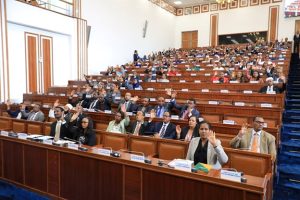
ADDIS ABABA- Even though the incumbent had amended the Civil Society Organizations (CSOs) law and replaced it by a more progressive one, the CSOs are still attached to the old practice, according CSOs experts.
that let CSOs operate in respective target areas. In an exclusive interview with The Ethiopian Herald, Negash Teklu, Executive Director of Population Health Environment (PHE) Ethiopia Consortium, said that the country has over three thousand five hundred CSOs, but most of them are operating in manner that limits and restricts them, which could be due trauma of past repressive laws.
The CSOs had been in forefront in pushing the incumbent to amend the law, and they all are proud of the recorded achievements Ethiopia has registered in that regard. According to Negash, the CSOs are not able to act in accordance with the newly amended proclamation as they are yet to receive the hard copy from the printing house, despite the fact that it was ratified six month ago. “The CSOs are developing ‘Civic Engagement Policy’, and are ready to conduct discussions in all parts of nation in order to make sure that citizens’ participation is flourishing.”
The ‘Civic Engagement Policy’ could pave way to strengthen various democratic institutions like Human Right Commission, Ombudsman, and the Media among others. To make sure all demands are met with high quality and integrity, the CSOs are developing code of conducts, and carrying out re-registration process of civic societies. This all should be translated to the ground benefiting the communities and improve their livelihood.
Akalewold Banteyrgu, a privatebased Civic Society Consultant, underlined that the post-2005 ‘Charities and Societies Proclamation’ that governed the establishment and operation of CSOs in the country was repressive. The former CSOs proclamation contains various provisions that made both the formation and effective working of civil societies highly difficult, if not impossible. It contravened the human rights guarantees stipulated under the Constitution as well as the regional and international human rights frameworks the country has ratified, he noted.
This has been constantly condemned by human rights groups, academics and activists over the years. “Thanks to the bold measure made by Dr. Abiy Ahmed, it one for all detached that opened new chapter that let all take part in nation building.” CSOs should work not only to provide development services and humanitarian relief, but also supply innovate service delivery in building local capacity needed to enable citizens practice democracy, nurture tolerance and accommodate pluralism and diversity, among others, through various approaches.
In line with these parameters, the country’s CSOs are yet to reach the desired goals. As to him, the pertinent stakes should detach themselves from the business as usual approaches and previous state. “I acknowledge the old oppressive CSOs law impact remains in mind, but it is already gone.” In my view, he continued, civil society organizations could help develop democratic values such as tolerance, moderation, compromise, and respect for opposing points of view.
Without this deeper culture of accommodation, democracy cannot be stable. These values cannot simply be taught; they must also be experienced through practice, he argued. “The government and the relevant stakeholders should support them to focus on more strategic issues they ever did before.” Ethiopian Teacher Association Secretary, Tilahun Tarekegn, stated that they had been working in amending the code with stakes, and the amendment is the turning point that could open the opportunity of CSOs to work in more engaging areas and impact the communities in various parts of the nation.
“We do have over 500 hundred thousand members, and the Association is planning to widen its engagements in ensuring quality education and establishing structures that could benefit teachers.” Mesfin Taddesse, Director of Communication Affairs at Agency for Civil Society Organization, for his part said the Agency is implementing the Revised Civil Society Organizations Proclamation that is recently approved by the House of People’s Representatives.
According to him, the revised law guarantees civil society organizations’ rights to engage in any lawful activity that benefit society and complies with the law, and let them operate in line with the priorities of the national polices. The Agency is making preparations to develop directives and necessary documents that could help manage the operations of CSOs.
Of the 4,000 civil society organizations that are operating in the country, screening is being carried out in registration with the view of letting them operate accordingly. Awareness creation platform is going to be organized to make sure each CSOs are well informed about the new law. It is high time for civil society organizations to get involved in all national activities.
“We have already witnessed that CSOs are playing an important role in enhancing transparency and good governance in developing countries by contributing to increased public debate on issues surrounding the formulation and implementation of government budgets as well as in supporting greater transparency of public revenues, and ensure fair election,” he concluded.
The Ethiopian Herald, May 15/2019
BY MENGISTEAB TESHOME





